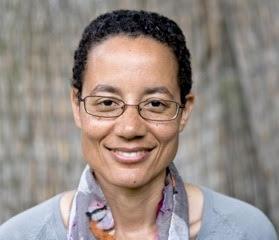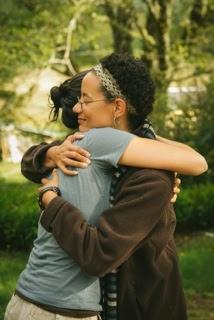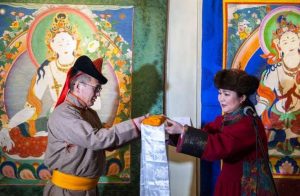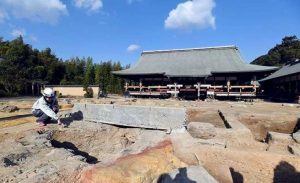
“Since I was 14, I’ve been looking for community,” says Kaira Jewel Lingo. A former Zen Buddhist nun, Lingo is now a lay teacher living in Washington, DC. Her search took her around the world to Plum Village, Thich Nhat Hanh’s mindfulness community in France. After nearly 15 happy years as a monastic she recently disrobed, only to find that the transition left her again seeking community in new and unexpected ways.
When we spoke earlier this month, it had been just over a year since she disrobed. Starting over at age 40 without savings, a job, or a home wasn’t easy. “Life moves a lot faster,” she says. “It is a lot harder to keep up, and to generate from inside of me the mindful structure and energy that used to be surrounding and containing me.” She left Plum Village for personal reasons: she wanted to start a family. While she had been happy as a monastic, she was ready to embrace a different role at a different stage of life. “A cycle had come to an end,” she says. “And a new cycle was beginning.”
Having lived as both a layperson and a monastic, Lingo knows what it means to seek out and create community. Her story illuminates how Buddhist practice takes many forms, even within a single person’s life. Because she has balanced a desire for family with the desire for personal transformation, Lingo has a story that is familiar for many women around the world. In her work now, as a Dharma teacher for educators, activists, young people, and people of color, she strives to create welcoming and equitable lay communities.
Much has been written about taking vows, but less is written about disrobing and the shock of re-entering lay life. “It’s an awfully difficult and hugely stressful transition,” Lingo says. “Every major thing in your life is shifting at the same time: location, community, financial security, job.” Like any big life change, the emotional changes are part of a larger shift that includes practicalities, such as paying taxes or rent, and awkward social moments, like going on your first date in nearly two decades.
The most shocking changes have been the practical ones, Lingo says. She was amazed by the sheer amount of work required in everyday life. “It’s bewildering,” she admits. “The things that many people took care of in monastic life, now I take care of them all myself—cooking, cleaning . . . Just to take care of one person living in one apartment, it’s a lot of work!” Moving to a big American city, with all its contingent stresses and fast-paced lifestyle, has been especially difficult.
The practicalities of personal finance, from bank accounts to renting an apartment, are a major challenge. It’s taken time, and the help of a financial consultant, for Lingo to learn the basics. “This is the first year I’m paying taxes,” she says. “Learning about personal finances is its own mini-career. Now I have to think about retirement, but I don’t have savings! What about saving for [my children’s] college?”
Despite the difficulties, Lingo is proud to have joined the community of householders. The first thing she did as a layperson was to become a monthly donor to Plum Village. “I wanted to support—just a small amount—but symbolic of my new role as someone who was allowed to hold onto resources and offer support to the monastic community,” she says.

Community has always mattered to Lingo. She was raised in Chicago in a Christian religious community that, she says, resembled monastic life in many ways. “They were laypeople trying to live a communal and simple life,” she explains. Her family left when she was a teenager, exposing her to consumer America—and Lingo always felt slightly at odds with the world of pop music and shopping malls. In college at Stanford University, where she studied anthropology, she sought co-ops and communal work environments, places where she could regain some of that childhood intimacy.
A two-year trip around the world took her to Plum Village. While staying at the monastery, “I was able to do deep work inside. It touched enormous joy and also deep suffering. I never had felt that happy before in my whole life,” she says. She put the rest of her trip on hold, realizing “it was more important to do an inner journey than an outer one.”
Lingo took monastic vows at age 25. During her 15 years as Sister Jewel, she lived in monastic communities in France; at Deer Park in the United States; and at the European Institute of Applied Buddhism in Germany. As a monastic, she helped edit the book Planting Seeds (Parallax Press, 2011), which collected resources and ideas on how to practice mindfulness with children.
Leaving the monastic order was not easy. First and foremost, Lingo loved being a nun. Monastic life was a “very strong container of practice and mindfulness energy. Anyone who came in contact with it was transformed by it,” she says. “It was so inspiring to me.” In addition, she took her vows seriously. The expectations of her order were that she would remain a monastic and serve all beings, as she had vowed to do; but the desire to start a family stayed with her. Finally she could no longer ignore it. “If I’m suppressing this desire [in order] to meet others’ expectations, I won’t be a very good nun,” she thought to herself.
Working now as a lay Dharma teacher, educator, and retreat leader, Lingo focuses on mindfulness education in schools, building nourishing practices for activists, and creating safe and welcoming sangha spaces for people of color. In all these endeavors, she brings her experience as a monastic to bear. “Kaira Jewel is an excellent collaborator—she has spent decades in an environment in which all activities are done in community,” says Annie Mahon, a lay practitioner and author who first met Lingo in Plum Village. The two have since collaborated on events that combine Buddhist practice, mindful eating, and food. “When we teach together, she brings a deep well of mindfulness practice and a wide breadth of teaching all kinds of people. These are two qualities that it isn’t usual to find in the non-monastic world.”
In the year since her decision, Lingo has found ways to work with the occasional distress she feels at being away from the monastic sangha. She found meditation groups in Washington, DC and sought out local teachers. Over time, she began to realize that she was still sheltered and protected by her practice; she could still take Refuge in the Dharma. “I might be struggling with these new things, but there are people there to help me,” she said. “There are bodhisattvas all over the place.”
This has perhaps been the real revelation for Lingo. Moving between lay and monastic life and back again has been “like waves,” she says. “[The transitions] are important, and they do take up time and energy and focus, but something much more real is the stillness underneath the surface. It isn’t affected by the changes of being respected, not being respected, having children, not having children.” Despite the myriad changes of identity, location, or status, Buddhist practices are steady, like deep currents of the ocean beneath a surface storm. “Sometimes I can touch into that. Sometimes when I’m hectic I can just . . .”—Lingo presses her hands down in a gesture of calming, her palms flat and extended—“. . . be still and touch this truth beneath the surface.”













